
Thanks to Das Kraftfuttermischwerk for making this awesome animated GIF.

Thanks to Das Kraftfuttermischwerk for making this awesome animated GIF.
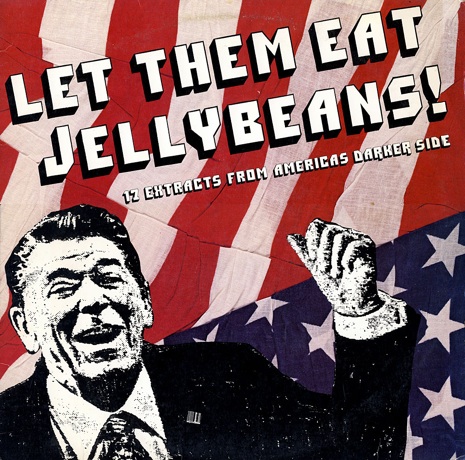
Besides, really, what does any of this matter if Armageddon is imminent?
10/13/83 Senate Majority Leader Howard Baker is informed that President Reagan has appointed William Clark – as unqualified for this job as for all his others – to be the new Secretary of the Interior. “You’re kidding,” says Baker. “Now tell me who it really is.”
10/19/83 Asked at a press conference about the safety of the US Marines in Beirut, President Reagan says, “We’re looking at everything that can be done to try and make their position safer. We’re not sitting idly by.”
10/23/83 A truck bomb at the US barracks in Beirut kills 241 Marines.
10/24/83 In the face of political strife on the island of Grenada, White House spokesman Larry Speakes calls press speculation about a US invasion “preposterous.”
10/25/83 Claiming that US medical students there are in grave danger, President Reagan diverts attention from the Beirut fiasco by launching an invasion of Grenada. Lest there be any doubt about Presidential involvement in this decision, photos are released showing a pajama‑clad Reagan – up at 5:15 a.m.! – being briefed on the situation. Curiously, reporters are prevented from covering the invasion.
10/26/83 American students from Grenada kiss the tarmac upon landing in South Carolina. Scoffs school bursar Gary Solin, “Our safety was never in danger. We were used by this government as an excuse to invade Grenada.” President Reagan says US troops “got there just in time” to prevent a Cuban takeover.
11/3/83 President Reagan explains that the military action he ordered in Grenada was not an invasion but was, rather, a “rescue mission.” As for a UN resolution deploring this action, “It didn’t upset my breakfast at all.”
12/3/83 Concrete barricades are erected in front of the White House to prevent truck bombers from cruising in as easily as they seem to in Beirut.
12/6/83 The Israeli newspaper Maariv reports that during a meeting with Prime Minister Yitzhak Shamir, President Reagan – who spent World War II making training films in Hollywood – claimed to have served as a photographer in an army unit filming the horrors of Nazi death camps. Shamir says Reagan also claimed to have saved a copy in case there was ever any question as to whether things had really been so bad. When asked just that question by a family member, Shamir quotes him as saying, “This is the time for which I saved the film, and I showed it to a group of people who couldn’t believe their eyes.”
12/6/83 Revealing his rather disturbing view about the “coming of Armageddon,” President Reagan says, “[Not] until now has there ever been a time in which so many of the prophecies are coming together. There have been times in the past when people thought the end of the world was coming, and so forth, but never anything like this.”
All entries are excerpted from the “Reagan Centennial Edition” of my 1989 book The Clothes Have No Emperor, available here as an enhanced eBook. More to come.
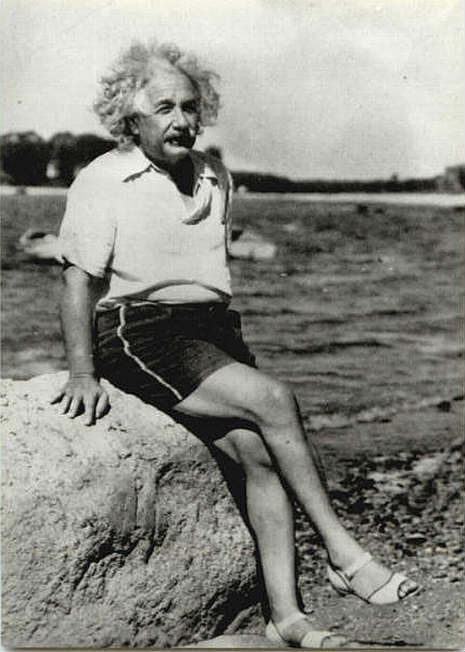
E=mcFAAABUloussss! Who knew Einstein had such wonderful gams?!
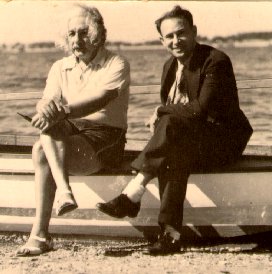
Einstein and David Rothman, 1939
There’s actually great back-story to Albert Einstein and those open-toed sandals. The man pictured with Einstein above is David Rothman, and he was the one responsible for selling Einstein the fancy footwear back in 1939. From Chuck Rothman’s “Albert Einstein’s Long Island Summer”:
In the summer of 1939, Albert Einstein spent his summer on Nassau Point, in Peconic, NY on eastern Long Island. My grandfather, David Rothman, was owner of Rothman’s Department Store in nearby Southold.
One June day, Einstein came into the store. Of course, my grandfather recognized him at once. He decided, though, to treat him just like any other customer.
“Are you looking for something in particular?” he asked
“Sundials,” Einstein said in his thick German accent.
Now, Rothman’s has always had a large variety of items—just about everything from housewares, to fishing tackle and bait, to hardware, to toys, to appliances. But no sundials. Not for sale, anyway. But…
“I do have one in my back yard,” my grandfather said.
He led Einstein—who seems a bit bewildered—to the back yard, to show him the sundial. “If you need one you can have this.”
Einstein took one look and began to laugh. He pointed to his feet. “No. Sundials.”
Sandals. Those, he had.
(via reddit)
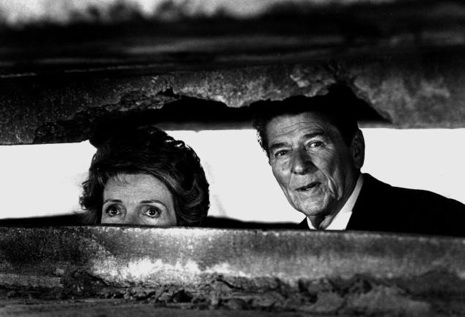
Also, a very bad man finally loses his job.
6/29/83 President Reagan appears on a TV tribute to James Bond, where he speaks about the fictional secret agent as if he was a real human. “James Bond is a man of honor,” says the President, “a symbol of real value to the free world.” Says Tip O’Neill aide Chris Matthews, “This is the kind of thing we all thought Reagan would be doing if he had lost the ‘80 election.”
7/26/83 Reagan appointee Thomas Ellis acknowledges at a Senate hearing that he belongs to an all‑white country club, was a recent guest of the government of South Africa (where he has extensive holdings) and served as director of a group that financed research on the genetic inferiority of blacks. Still, he says, “I do not believe in my heart that I’m a racist.” He withdraws his name two days later.
8/2/83 Rep. Pat Schroeder (D‑CO) says that Reagan is “perfecting the Teflon‑coated presidency ... nothing sticks to him. He is responsible for nothing – civil rights, Central America, the Middle East, the economy, the environment. He is just the master of ceremonies at someone else’s dinner.”
8/22/83 Barbara Honegger resigns her job at the Justice Department after writing an Op‑Ed piece for The Washington Post in which she calls Reagan’s policies toward women “a sham.” Described by a department spokesman as a “low‑level munchkin,” she holds a news conference three days later to display a photograph of herself with President Reagan. “They called me a Munchkin,” she says. “This is me with the Wizard of Oz.”
9/1/83 A Soviet fighter mistakenly shoots down Korean Air Lines flight 007 after it strays into Soviet airspace, killing 269. George Shultz calls Tip O’Neill to tell him about the incident. “What does the President think about this?” asks O’Neill. “We’ll tell him when he wakes up,” says Shultz. Only after CBS shows President Reagan on horseback at his ranch as the crisis unfolds does he reluctantly return to Washington.
9/15/83 President Reagan wears his new hearing aid at a state dinner, prompting fashion‑conscious guest Merv Griffin to exclaim, “I think everybody’s running out to get them whether they need them or not.” Despite Griffin’s fatuous comment, there is in fact no surge in the purchase of unnecessary hearing aids.
9/21/83 Interior Secretary James Watt describes the makeup of his coal‑leasing commission to a group of lobbyists. “We have every kind of mix you can have,” he says. “I have a black, I have a woman, two Jews and a cripple.” As a public furor erupts, a spokesman explains that Watt “was attempting to convey that this is a very broadly based commission.”
9/27/83 Polio victim Bob Brostrom arrives at the White House on crutches to present 120,000 pieces of mail supporting James Watt. If Watt loses his job for saying “cripple,” argues Brostrom, then hospitals for “crippled children” should change their names.
10/4/83 At a meeting with congressmen to discuss arms reduction, President Reagan – in office for almost three years – says he has only recently learned that most of the USSR’s nuclear arsenal is land‑based. This elementary information is essential to any rational thinking about disarmament.
10/9/83 Claiming that his “usefulness” to President Reagan “has come to an end,” James Watt resigns. “The press tried to paint my hat black,” he says of his troubled tenure, “but I had enough self‑image to know the hat was white.” He later assumes a crucifixion pose for photographers.
All entries are excerpted from the “Reagan Centennial Edition” of my 1989 book The Clothes Have No Emperor, available here as an enhanced eBook. More to come.
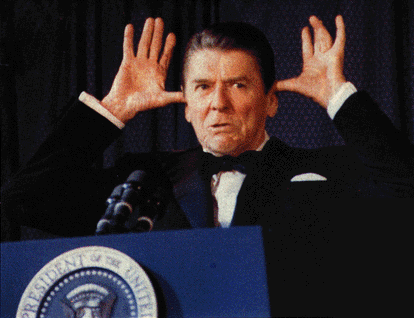
The President says and does some more stupid things.
4/14/83 President Reagan is asked if his administration is trying to overthrow the Sandinistas in Nicaragua. “No,” he says, “because that would be violating the law.”
4/18/83 Seventeen Americans and 46 Lebanese are killed when a truck bomb plows into the US embassy in Beirut.
4/27/83 President Reagan asks Congress for $600 million for his Central American policies, pointing out – as if it had some relevance – that this “is less than one‑tenth of what Americans will spend this year on coin‑operated video games.”
5/4/83 President Reagan lauds the Nicaraguan contras as “freedom fighters” and observes that nuclear weapons “can’t help but have an effect on the population as a whole.”
5/18/83 During a speech to the White House News Photographers dinner, President Reagan sticks his thumbs in his ears and wiggles his fingers. Says the leader of the free world, “I’ve been waiting years to do this.”
5/28/83 Telling his aides that, rather than reading his briefing books, he spent the eve of the Williamsburg economic summit watching The Sound of Music, President Reagan says, “I put them aside and spent the evening with Julie Andrews.”
6/9/83 Addressing a forum in Minnesota, President Reagan is asked how the Federal Government plans to respond to a report on education that he has “approved ... in its entirety.” He is unable to provide anything more specific than that he is “going to have meetings,” and finally turns to Education Secretary T. H. Bell for help. “Could you fill in what I left out?” the President asks Bell. “I won’t be offended.”
6/10/83 Reacting to President Reagan’s claim that he has increased federal aid to education, House Majority Leader Jim Wright (D-TX) says, “It embarrasses all of us as Americans to have to point out that the President of the United States is not telling the truth ... I want to believe that he doesn’t know any better. I want to believe that those who furnish him those spurious statistics are the culprits and that the President of the United States is innocently making these statements, not aware of their total untruth.”
6/16/83 Ariela Gross, a 17‑year‑old New Jersey student, meets with President Reagan to present him with a petition supporting a nuclear freeze. She reports that the President “expressed the belief that there must be something wrong with the freeze if the Soviets want it.”
6/29/83 President Reagan suggests that one cause of the decline in public education is the schools’ efforts to comply with court‑ordered desegregation.
All entries are excerpted from the “Reagan Centennial Edition” of my 1989 book The Clothes Have No Emperor, available here as an enhanced eBook. More to come.

Oddly beautiful, but still wince-making, x-ray images of the nasty health consequences of the absurd things Victorian-era women put themselves through to attract MEN… From Doctor O’Followell’s Le Corset written in 1908.
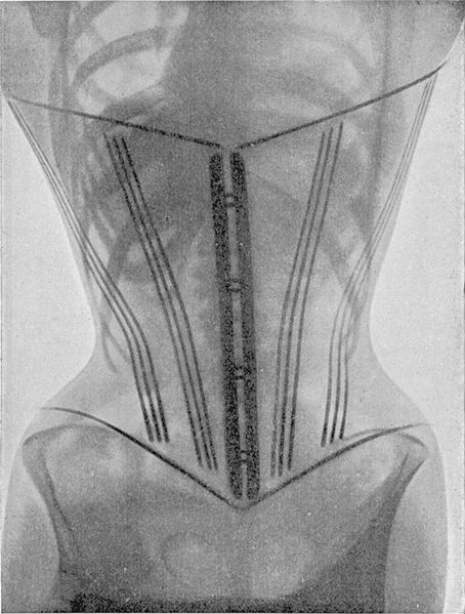
See more images after the jump…
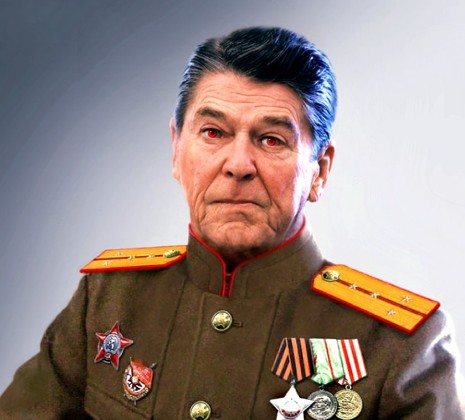
Also in this installment, the President talks repeatedly about his ass.
1/10/83 Complaining about loose-lipped members of his Administration talking to the press, President Reagan declares, “I’ve had it up to my keister with these leaks.” This causes The New York Times to explain that “keister” is a “slang term for rump.”
1/13/83 Responding to Michael Deaver’s literary agent’s announcement that The Deaver Diet – recounting the Reagan PR guru’s 35-pound weight loss – will be published in 1984, columnist William Safire writes, “The Reagan White House has pioneered the New Graft. Instead of selling influence, sell your White House celebrity.” In an editorial, The New York Times notes, “For a White House aide to publish a diet book while jobless totals rise and cheese lines lengthen is a sure setup for Johnny Carson.” The book is never published.
1/20/83 In an interview with Business Week, Interior Secretary James Watt – who has described environmentalists as “a left-wing cult dedicated to bringing down the type of government I believe in” – compares them to Nazis. “Look what happened to Germany in the 1930s,” he says. “The dignity of man was subordinated to the powers of Nazism ... Those are the forces that this can evolve into.” Observes Wilderness Society chairman Gaylord Nelson, “I think the secretary has gone bonkers.”
1/20/83 President Reagan tells reporters about “the ten commandments of Nikolai Lenin ... the guiding principles of Communism,” among them “that promises are like pie crust, made to be broken.” Soviet scholars claim that no such commandments exist, and point out that Lenin’s name was Vladimir.
1/25/83 Unimpressed by President Reagan’s understanding of the underclass, NAACP executive director Benjamin Hooks says, “For the last thirty years he’s been in a dream world ... I think he actually believes that giving more to rich people will make them work harder, whereas the only way to make poor people work is to tax their unemployment benefits.”
2/15/83 The New York Times: REAGAN MISSTATEMENTS GETTING LESS ATTENTION
2/24/83 Three Canadian documentaries, including the Academy Award nominee If You Love This Planet, are classified as “political propaganda” by the Justice Department.
3/8/83 President Reagan tells a national convention of evangelicals that the Soviet Union is “the focus of evil in the modern world ... an evil empire.” Says historian Henry Steele Commager, “It was the worst presidential speech in American history, and I’ve read them all.”
3/22/83 Describing a memorable moment at a GOP leadership meeting, Sen. Bob Dole (R-KS) says, “The President, in one of the rare times I have seen him really disgusted, threw his glasses down and said he’s had it up to his keister with the banking industry.” The New York Times again explains that “keister” is a “slang term for rump.”
3/23/83 In what will become known as his “Star Wars” speech, President Reagan proposes a space‑based defense system to laser-blast incoming missiles out of the sky, just like in the movies. Just like one in particular: the 1940 film Murder In the Air, whose hero, Secret Service Agent Brass Bancroft (played by Ronald Reagan), gets involved with “The Inertia Projector,” a death ray that can shoot down planes.
All entries are excerpted from the “Reagan Centennial Edition” of my 1989 book The Clothes Have No Emperor, available here as an enhanced eBook. More to come.
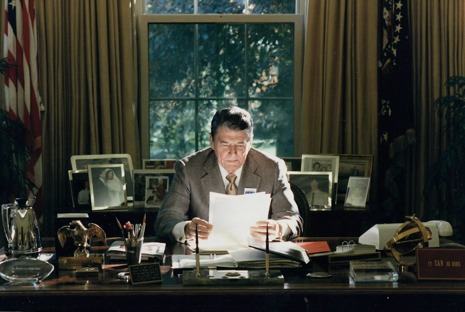
Previously on The President Reagan Show, he told a Time magazine reporter that he sometimes feels trapped in the White House: “You glance out the window and the people are walking around Pennsylvania Avenue and you say, ‘I could never say I am going to run down to the drugstore and get some magazines.’ I can’t do that anymore.”
10/12/82 White House spokesman Larry Speakes to the press: “You don’t tell us how to stage the news, and we don’t tell you how to report it.”
10/19/82 During a White House meeting with Arab leaders, President Reagan turns to the Lebanese foreign minister. “You know,” he says, “your nose looks just like Danny Thomas’s.”
11/11/82 President Reagan explains that his proposed five-cents-a-gallon gasoline tax would not be a tax at all. “It would be,” he explains, “a user fee.”
11/25/82 Larry Speakes chooses Thanksgiving as the ideal moment to announce that the White House is considering a proposal (conceived by Ed Meese) to tax unemployment benefits. This, says Speakes, would “make unemployment less attractive.”
11/26/82 Ed Meese denies that taxing unemployment benefits has been seriously considered, though he can’t help adding, “We do know that generally when unemployment benefits end, most people find jobs very quickly.”
12/4/82 President Reagan returns home from his five-day trip to Latin America. “Well, I learned a lot,” he tells reporters. “You’d be surprised. They’re all individual countries.” An aide is soon sent out to explain that the President certainly didn’t mean to imply that he was surprised by this.
12/9/82 Discussing his feelings of confinement with a reporter for People magazine, President Reagan says, “Sometimes I look out there at Pennsylvania Avenue and see people bustling along, and it suddenly dawns on me that probably never again can I just say, ‘Hey, I’m going down to the drugstore to look at the magazines.’”
12/15/82 Literary agent Bill Adler announces that The Deaver Diet, recounting the White House aide’s 35‑pound weight loss, will be published in early 1984. Adler says the book will consist of 75% diet, 20% exercise and 5% “inspiration.”
12/16/82 Spontaneously conveying one of his regrets to a Washington Post reporter, President Reagan says, “I sometimes look out the window at Pennsylvania Avenue and wonder what it would be like to be able to just walk down the street to the corner drugstore and look at the magazines. I can’t do that anymore.”
12/18/82 Sharing a sudden thought with a radio interviewer, President Reagan says, “I sometimes look out the window at Pennsylvania Avenue and wonder what it would be like to be able to just walk down the street to the corner drugstore and look at the magazines. I can’t do that anymore.”
All entries are excerpted from the “Reagan Centennial Edition” of my 1989 book The Clothes Have No Emperor, available here as an enhanced eBook. More to come.
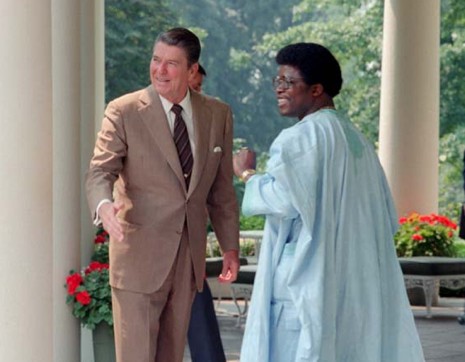
The next chapter, in which President Reagan introduces “Chairman Moe” of Liberia.
7/2/82 Caught off guard at his 12th press conference by Sarah McClendon’s question about “sex harassment of women” working in government, President Reagan waggles his head and says, “Now, Sarah, just a minute here with the discussion or we’ll be getting an R rating.” Many reporters – Sarah not among them – find this inane quip amusing enough to actually laugh at.
8/2/82 Seeking to convey the Administration’s displeasure with Israel over its attacks on Beirut, the White House points out the difference between a February 1981 photo in which President Reagan is sitting next to Israeli Foreign Minister Yitzhak Shamir and laughing, and today’s photo, in which Reagan frowns at him from across a table.
8/11/82 President Reagan tells Time’s Hugh Sidey that he sometimes feels trapped in the White House. “You glance out the window and the people are walking around Pennsylvania Avenue and you say, ‘I could never say I am going to run down to the drugstore and get some magazines,’” he says. “I can’t do that any more.”
8/17/82 Introducing Liberian head of state Samuel Doe, President Reagan says, “Ladies and gentlemen, Chairman Moe of Liberia is our visitor here today, and we’re very proud to have him.”
9/6/82 The Washington Post reports that of President Reagan’s first 72 nominees to the judiciary, 68 are white males.
9/14/82 Defending his support of anti‑abortion legislation, President Reagan says, “I think the fact that children have been prematurely born even down to the three‑month stage and have lived to, the record shows, to grow up and be normal human beings, that ought to be enough for all of us.” Later, aide Peter Roussel acknowledges that the record shows nothing of the kind: the youngest surviving fetus was four‑and‑a‑half months old. (A three‑month‑old fetus is, at most, three‑and‑a‑half inches long.) Was Reagan aware of this? “He knew,” says Roussel, “but he said three instead of four and a half.”
9/30/82 Two days after President Reagan commits the Marines to an indefinite stay in Lebanon, David L. Reagan (no relation) becomes the first Marine to be killed in the conflict.
10/4/82 President Reagan suggests – and not, by any means, for the first time – that since he sees big help wanted sections in the Sunday papers, unemployment must be caused by a lot of lazy people who’d just rather not work.
10/4/82 Addressing an Ohio veteran’s group, President Reagan discusses plans to strengthen three military divisions in Western Europe, “two of which are in Geneva, and one, I believe, still in Switzerland.”
10/8/82 The unemployment rate hits 10.1%, the highest in 42 years. This does not overly concern President Reagan, who soon puts it in perspective. “Just remember,” he says, “for every person who is out of work, there are nine of us with jobs.”
All entries are excerpted from the “Reagan Centennial Edition” of my 1989 book The Clothes Have No Emperor, available here as an enhanced eBook. More to come.
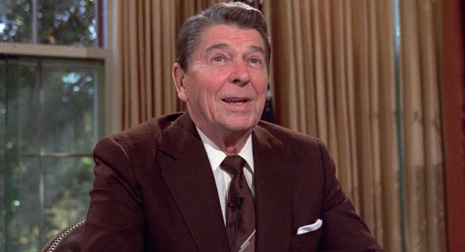
More stories about ignorance and food stamps.
2/27/82 The Congressional Budget Office finds that taxpayers earning under $10,000 lost an average $240 from last year’s tax cuts, while those earning over $80,000 gained an average of $15,130.
3/1/82 Sen. Bob Packwood (R‑OR) reveals that President Reagan frequently offers up transparently fictional anecdotes as if they were real. “We’ve got a $120 billion deficit coming,” says Packwood, “and the President says, ‘You know, a young man, went into a grocery store and he had an orange in one hand and a bottle of vodka in the other, and he paid for the orange with food stamps and he took the change and paid for the vodka. That’s what’s wrong.’ And we just shake our heads.”
3/1/82 In a speech to the Civil Defense Association, Ed Meese describes nuclear war as “something that may not be desirable.”
3/24/82 Agriculture official Mary C. Jarratt tells Congress her department has been unable to document President Reagan’s horror stories of food stamp abuse, pointing out that the change from a food stamp purchase is limited to 99 cents. “It’s not possible to buy a bottle of vodka with 99 cents,” she says. Deputy White House press secretary Peter Roussel says Reagan wouldn’t tell these stories “unless he thought they were accurate.”
4/15/82 Citing a favorite example of British jurisprudence, President Reagan says, “England was always very proud of the fact that the English police did not have to carry guns ... In England, if a criminal carried a gun, even though he didn’t use it, he was not tried for burglary or theft or whatever he was doing. He was tried for first‑degree murder and hung if he was found guilty.” White House spokesman Larry Speakes, on being informed that this fable is totally untrue, responds, “Well, it’s a good story, though. It made the point, didn’t it?”
4/30/82 President Reagan describes the Falkland Islands war as a “dispute over the sovereignty of that little ice‑cold bunch of land down there.”
5/10/82 Taking questions from students at a Chicago high school, President Reagan explains why his revised tax exemption policy could not possibly have been intended to benefit segregated schools. “I didn’t know there were any,” he says. “Maybe I should have, but I didn’t.”
5/21/82 Discussing Soviet weaponry at a National Security Council meeting, President Reagan asks CIA deputy director Bobby Inman, “Isn’t the SS‑19 their biggest missile?” No, Inman replies, “that’s the SS‑18.” “So,” says the President, “they’ve even switched the numbers on their missiles in order to confuse us!” Inman explains that the numbers are assigned by US intelligence.
6/17/82 Interior Secretary James Watt – one of whose semantic rules is, “I never use the words Democrats and Republicans. It’s liberals and Americans” – warns the Israeli ambassador that if “liberals of the Jewish community” oppose his plans for off‑shore drilling, “they will weaken our ability to be a good friend of Israel.”
6/20/82 Defense Secretary Caspar Weinberger explains the Pentagon’s position on a “protracted” nuclear war: “We don’t believe a nuclear war can be won,” but “we are planning to prevail if we are attacked.” The difference between winning and prevailing is not explored.
All entries are excerpted from the “Reagan Centennial Edition” of my 1989 book The Clothes Have No Emperor, available here as an enhanced eBook. Much more to come.